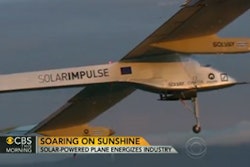SAN FRANCISCO (AP) -- Steven Spriggs was stopped in a traffic jam near downtown Fresno and thought nothing of whipping out his iPhone 4 and clicking on the map feature to see if there was an alternate route around the construction mess.
He was startled when he looked up and saw a California Highway Patrol motorcycle officer ordering him to pull over. He showed the officer that he was looking at a map and not texting or talking.
"'Pull over,'" Spriggs recalled the officer as saying. "'It's in your hand.'"
A little more than a year later, Spriggs is at the heart of a novel court case that has technology blogs and social media sites buzzing about the $160 ticket plus court costs he was ordered to pay for "distracted driving."
A court commissioner and then a three-judge appellate panel of the Superior Court found Spriggs guilty of violating a California law that bans motorists from texting or conducting phone conversations with hand-held devices.
The judges rejected Spriggs' argument that they were expanding the law by refusing to toss out the ticket he got in January 2012.
Spriggs, who graduated from law school but is not a practicing attorney, represented himself before the commissioner and then the appeals panel. He initially brought a paper map to court to argue that it was legal to hold it while driving. Not persuaded, the traffic court commissioner found him guilty.
Next, he appealed to the three-judge panel of Fresno Superior Court, arguing in a legal brief that the iPhone has a flashlight feature and other functions that can be useful to a driver and aren't as dangerous as texting or talking. That hearing last all of 30 seconds because no one from the CHP or district attorney's office appeared to oppose the appeal by Spriggs.
He still lost.
Fresno County Judge Kent Hamlin, writing on March 21 for the three-judge panel upholding the commissioner's ruling, said "the primary evil sought to be avoided is the distraction the driver faces when using his or her hands to operate the phone. That distraction would be present whether the wireless telephone was being used as a telephone, a GPS navigator, a clock or a device for sending and receiving text messages and emails."
The ruling doesn't apply outside of Fresno County.
Nevertheless, Spriggs said he is troubled that police can now pull over motorists they suspect of simply holding their mobile phones.
Spriggs, a fundraiser for Fresno State University, said he's unsure if he has the time or money to pursue further appeals to the California Court of Appeal and the state Supreme Court.
"I'm just a little guy who is frustrated," Spriggs said. "I don't see how they can extend this law."
He actually supports the prohibition on texting and conversing on hand-held devices while driving, saying his adult son's leg was badly broken in 2010 when he was struck by a motorist who was chatting on a mobile phone.
Judge Hamlin acknowledged in his ruling that changes in the law may be needed.
"It may be argued that the Legislature acted arbitrarily when it outlawed all 'hands-on' use of a wireless telephone while driving, even though the legal use of one's hands to operate myriad other devices poses just as great a risk to the safety of other motorists," the judge wrote in the March 21 ruling. "It may also be argued that prohibiting driving while using 'electronic wireless communications devices' for texting and emailing, while acknowledging and failing to prohibit perhaps even more distracting uses of the same devices, is equally illogical and arbitrary."
But the judge said it's up to the Legislature to amend the law. Until then, Hamlin wrote, courts are compelled to deem illegal nearly all uses of hand-held phone by motorists.






















